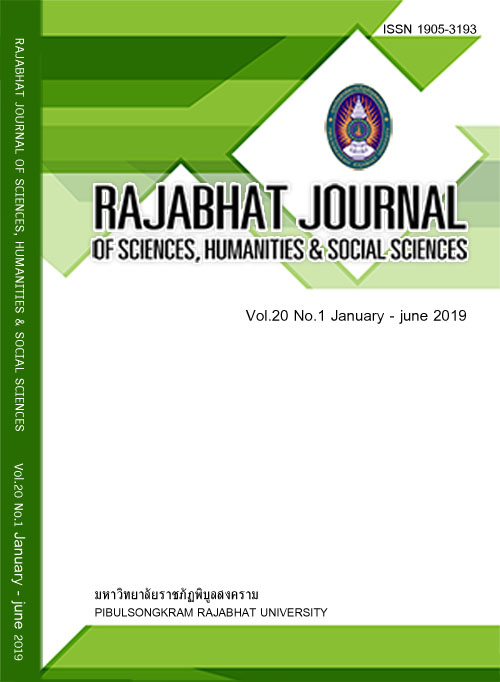GENERIC STRUCTURE DEVELOPMENT ON UPPER SECONDARY SCHOOL STUDENTS’ PERSONAL ANECDOTE RECOUNT WRITING TEXTS THROUGH SFL (SYSTEMIC FUNCTIONAL LINGUISTICS) GENRE-BASED APPROACH
Keywords:
personal anecdote recount, generic structure, modeling text, conformity, thematic reconstructionAbstract
This paper reports on the case study of teaching writing recounts for the English as a Foreign Language (EFL) Thai upper secondary school students using Systemic Functional Linguistics (SFL) genre-based approach at Hunkhapittayakom secondary school, Hunkha district, Chainat province, Thailand, in the second semester of the academic year 2015. The purpose of the study was to analyze students’ generic structure development on personal recount texts through the SFL perspective. Teaching of personal anecdote recount genre using the teaching-learning cycle of the SFL genre-based approach was employed of 26, 2nd year upper secondary school students of a special science-math program. The analysis of the students’ pretest writing texts discovered that their writing products were non-conformed to the stages of recount writing, and the themes were sidetracked from the topic. Subsequently, students were instructed by using the SFL genre-based approach. Comparing to the modeling texts of the literature review and the pretest texts at the commencement of the course, the analysis demonstrated that their personal anecdote recounts were positively developed with a higher degree of generic structure construction in terms of conformity and thematic reconstruction. The study suggests that the teaching cycling applied from SFL genre-based approach promoted students’ creating and understanding about text organization and writing skills.
References
Callaghan M, Rothery J. Teaching Factual Writing. NSW: Metropolitan East Disadvantaged Schools Program, Erskineville; 1993.
Christie F. Language Education in the Priamary Years. Sydney: University of New South Wales Press; 2005.
Christie F, Maton K. Disciplinarity: Functional Linguistics and Sociological Perspectives. London: Continuum; 2011.
Christie F, Unsworth L. Developing dimensions of an educational linguistics. In Webster J, Matthiessen C, Hasan R. (Eds.), Continuing Discourse on Language: A Functional Perspective. London: Equinox; 2006.
David J, Liss R. Effective Academic Writing 3. Oxford: Oxford University Press; 2006.
Derewianka B. Trends and issues in genre-based approach. A Journal of Language Teaching and Research. 2003; 34(2): 133-149.
Droga L, Humphrey S. Getting Started with Funtional Grammar. Berry: Target Texts; 2002.
Feez S. Heritage and Innovation in Second Language Education. In Johns A M. et al. Genre in the classroom. Mahwah, NJ: Erbaum; 2002: 47-68.
FrenchA. “What am I Expecting and Why?” How can lecturers in higher education begin to address writing development for their students? Journal of Academic Writing. 2011; 1(1): 228–238.
Government of South Australia, Department of Education and Child Development. Recount writing: A practical guide for classroom teachers. Engaging in and Exploring. 2012; June: 1-5.
Halliday M A, HasanR. Language, Context and Text: Aspect of Language In Asocial-Semiotic Perspective (2nd ed). Oxford: Oxford University Press; 1985.
Hood S. Appraisal Research: Evaluation in Academic writing. Long Palgrave: Macmillan; 2010.
Jacobs GM, Seah-Tay H. Using cooperative learning to teach via text types. The Reading Matrix. 2004; 4(2): 117-126.
Kruse O. Perspectives on academic writing in European education: genres, practice and competences. Revista de Docencia Universitaria. 2013; 11(1): 37–58.
Kuiper C, Smit J, De Wachter L. et al. Scaffolding tertiary students’ writing in a genre-based writing intervention. Journal of Writing Research. 2017; 9(1): 27-59.
Kulprasit W, Chiramanee T. Using Journal Writing with peer feedback to enhance EFL students’ writing ability across proficiency levels. A Journal of Language Teaching and Learning. 2013; 45: 91-112.
Lakarnchua O, Wasanasomsithi P. Encouraging Thai EFL students' recursive progression through the writing process with blogs. A Journal of Language Teaching and Learning. 2013; 45: 113-134.
Martin J R, Rose D. Genre Relation Mapping Culture. London: Equinox; 2008.
Martin JR, White PR. The Language of Evaluation: Appraisal in English. London & New York: Palgrave, McMillan; 2005.
Mingsakoon, P. Development of secondary school students’ generic structure execution in personal experience recount writing texts through SFL genre-based approach. Journal of Advances in Language and Literary Studies. 2018; 9(6): 112-119.
Padgate W. Beliefs and opinon about English writing at a Thai university. Journal of Advances in Language and Literary Studies. 2008; 42: 31-54.
Paltridge B. Genre and the language learning classroom. Ann Arbor, MI: University of Michigan Press; 2001.
Rose D. Reading genre: A new wave of analysis. Linguistics and Human Science. 2006; 2(1): 24-49.
Srinon U. A Longitudinal Study of Developments In The Academic Writing of Thai University Students In The Context of A Genre Based Pedagogy, PhD thesis, the university of Adelaide, Australia; 2011.
Trenholm S, Jensen A. Interpersonal Communication Seventh Edition. New York: Oxford University Press; 2013. 360-361.
Thompson G. Introducing Functional Grammar, 3rd ed. London and New York: Routledge; 2014.
Widodo H. Comparative writing. Journal for Language Teaching. 2006; 28(1): 20-32.
Downloads
Published
How to Cite
Issue
Section
License
Each article is copyrighted © by its author(s) and is published under license from the author(s).









